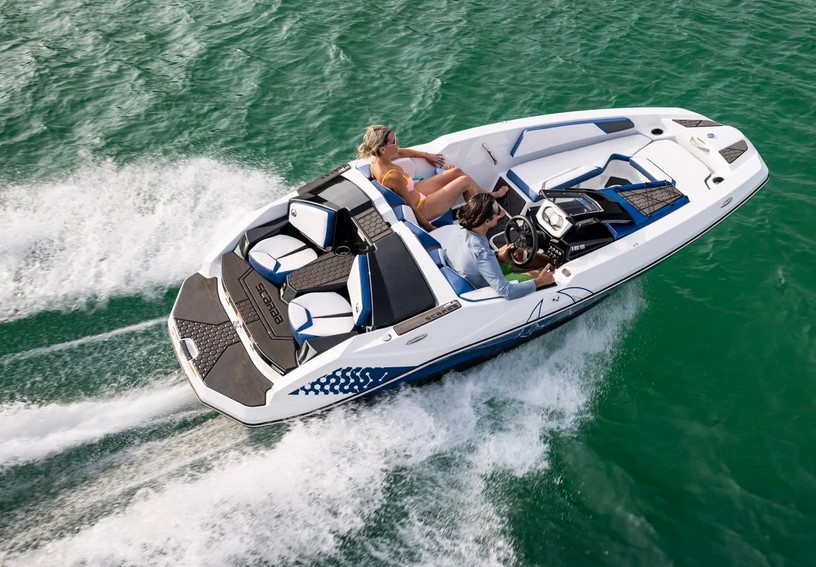Owning a boat is a lot of fun because of the ability to explore the water when you have free time. Of course, you won't go into the water alone every time; you can bring your friends and family along on your expeditions and create beautiful memories together. Most people would like to own a vessel and have this lifestyle. Once you decide to make the commitment, you need to find the boat of your dreams. It is at this stage that you will consider a loan. Boats can range in price from super affordable to pricey for your budget. Yet if you have solid credit, the process is straightforward. Once you have found your dream boat, you will need to choose a loan. The right loan. This article is about what you need to consider when picking the best loan for you.

How Can You Compare Loans?
If you are considering seeking a boat loan, you must compare the different options available. This step will help you select a lender that offers loans with the best terms that match your budget. The best way to compare the loans is by analyzing factors like amounts, interest rates, eligibility requirements, and terms.
Eligibility Requirements
Every lender has unique eligibility requirements that borrowers must meet to qualify for a loan. However, most of them have certain common factors that they require from you, such as a debt-to-income ratio, credit score, and income.
Annual Percentage Rates (APR)
The APR is the total cost of borrowing money. The figure comprises both the fees and interest rate. The fees you need to pay for a boat loan include loan processing fees, registration fees, title fees, and taxes. A good credit score will help you qualify for a low APR, which means the loan will be cheaper than someone with a bad credit score. Opt for a lender with low fixed rates, APR discounts, and minimal fees.
Repayment Terms
Repayment terms represent the months or years you will be expected to repay the loan. If the repayment period is short, your interest will be lowered, your monthly payments will be higher, and vice versa.
Loan Amount
A lender will give you a certain amount of loan based on the cost of the boat, your income, credit score, and credit history. Choose a lender with a high loan amount if you are buying an expensive vessel.
Reputation
It’s also crucial to choose lenders with good business practices and reputations. It will also be best to pick a lender that’s answerable to vital credit bureaus, offers special perks to customers, and excellent customer service. Some lenders can give you a bad experience and waste your time, so conducting a thorough background check on them before committing is good.
Flexibility
A good lender also offers loans to a broad group of people, and their loans need fewer requirements. Some lenders claim they can lend to people with a credit score of 600, yet most of the borrowers they approve have a credit score of above 700. So, it’s crucial to know whether the lender you choose has favorable conditions and services such as pre-approval and pre-qualification process, quick funding, availability to people in a large geographic area, acceptance of joint applications or co-signers, and low credit qualifications.
Essential Tips When Comparing Loans
Prequalify if the company allows it
Most lenders allow potential borrowers to prequalify for a loan. In this case, an applicant can provide information about their income, existing loans, and other pertinent details, and they will learn what kind of repayment terms, APR, and loan amounts they can get.
Prioritize specialty loan providers
Search for a specialty financier if your circumstances are unique, for instance, if you are buying a houseboat.
How Does Financing a Boat Work?
Boat loans are either secured or unsecured loans. Most lenders who offer boat loans have secured loans, meaning that the boat you are buying becomes the collateral for the loan, and the lender can seize it if you default on the loan. The good thing about this kind of loan is that the borrower can get more favorable terms, like decreased rates, since the loan is less risky for the loan provider.
Other lenders offer unsecured loans, particularly online lenders. Such loans don’t need any collateral. However, the lenders charge a higher interest rate, and you must provide many requirements to qualify for the loan.
Once you are given the loan, you will pay it back with interest with a term of between one and twenty years. Each lender has different terms. They may charge prepayment or late payment penalties and other fees. Before signing that agreement form, find out everything about the lender so you can know what to expect.
Boat Loan Approval Requirements
Every lender has different requirements that borrowers must meet to access a boat loan. Generally, they consider two essential requirements: the boat you want to buy and your financial standing. These are the approval requirements lenders might consider:
Income
They check your income to ensure that you will be able to service the loan. Every lender sets a different minimum income for borrowers.
Credit Score
Different lenders require varying minimum credit scores. It would help if you had a credit score of at least 600 to increase your chances of getting a loan from many lenders.
Boat age
Certain lenders will only fund boats that are of a specific age. Most prefer boats that are not older than 20 years.
Down Payment
Lenders specializing in offering boat loans usually require you to pay a down payment ranging from 10% to 20% of the total loan amount.
Refinancing a Boat Loan
If you have difficulty repaying your loan, you may find ways to refinance it. Most lenders who provide boat loans usually offer refinancing services so that you can refinance your boat loan through them. When you refinance with your current lender, they can extend your repayment term and reduce your monthly payment or interest, making it easier to repay the loan.
Steps to refinance your boat loan.
- Compare different rates from refinance lenders.
- Complete an application form.
- Focus on the money transaction. The refinancing lender might pay your old lender directly or send the money to you.
- Change the title of your boat. The new lender should hold a lien until you pay off the loan.
- Clear your new loan. Pay the loan using autopay until you pay it off.
How Can You Qualify to Get Boat Financing?
Financing a boat can be challenging, especially if you have a bad credit score of below 620. However, if you pay your debts on time and have a good credit score, lenders will be willing to lend you money at reasonable terms, such as a low-interest rate and longer repayment terms. Nevertheless, some lenders are eager to issue loans to borrowers with lower scores. So, you must research and find such lenders if your credit score is around 500.
Once you apply for a loan, lenders will want to know your credit score, and they will inquire about specific information. If you don’t know your credit score, you can check online and find out the score. They will ask you about the boat’s details, such as the value, age, model, and whether it’s new or used. They will also want to know your financial situation, including your income and debt-to-income ratio. You will also need to provide the lender with your details, such as your date of birth, social security number, contacts, address, and name.
How Can You Apply For a Loan to Purchase a Boat?
You need to follow various steps when applying for a boat loan. Like any other loan, you must do your homework and compare different lenders to see which has the best terms depending on your financial status. Some lenders can lend you up to 30 million dollars, while others cannot give you a loan of more than $150,000. So, you must know how much money you want to borrow. These are the steps for applying for a boat loan:
- Decide your budget. If you are serious about buying a boat and seeking a loan to achieve this dream, you must know your financial situation. This means knowing your monthly earnings and expenditures to have a clear picture of how much money you can afford to service a loan every month. If you fail to do this important evaluation, you may spend too much on a loan and have difficulty meeting your financial obligations with the little money left. You can find a calculator online that can help you know the approximate amount of money you will pay towards the loan every month.
- Know your credit score. Find out your current credit score; if it’s terrible, take the necessary actions to improve it. These include paying off outstanding debts and consolidating loans.
- Preapprove or prequalify for loans. Most lenders will allow you to prequalify for a loan. To preapprove entails getting an official offer from a financier that states the amounts, terms, fees, and rates you can expect to get if you apply for a loan from that lender. On the other hand, to prequalify is almost a similar thing, but it’s not an official offer. But it will give you an estimate of the amount and terms a lender will offer you without affecting your credit score.
- Shop around for loans. When looking for a loan, don’t settle for the first lender you come across. Compare offers from several lenders and ensure that you read their terms carefully.
- Sign a loan agreement. After you have chosen the right lender with the best loan terms, you must provide documents such as government-issued identification. If the lender is satisfied with your papers, they will give you a loan agreement to sign, and you can start paying the monthly installments. Use autopay services so you can pay off the payments monthly with ease. This way, you will avoid forgetting to make a payment and defaulting since payments will be done automatically.
The Process of Getting a Used Boat Loan
You may buy a used boat instead of a new one to save money and avoid the significant loss of value that happens with new vessels. New boats depreciate by 15% within the first year after buying them.
If you want to go this route, you can get used boat loans from lenders like your boat dealer, online lenders, credit unions, and banks. If you don’t qualify for a boat loan, you can finance it with other loans such as a home equity line of credit, a home equity loan, and a personal loan.
Frequently Asked Questions (FAQS)
Can you get boat loans for older boats?
Most lenders finance boats that are as much as 20 years old. If the boat’s value is high, some lenders may agree to fund the purchase of the vessel even if it’s 25-30 years old. The interest rates for such boats will be more than those for new watercrafts.
What is the average interest rate on a boat loan?
The average interest rate on a boat loan is 10.5%. Most lenders’ rates start at 7% and can be as high as 19%.
What is the average interest rate on a Boatzon loan?
Get pre-qualified and see your rate at loans.boatzonloans.com
What credit score do you need to finance a boat?
Most boat loan lenders require a minimum credit score of at least 670. But when you shop around, you can find lenders willing to offer boat loans to borrowers with a credit score of between 600 and 700, especially online lenders. If you think your credit score should be higher than it is, you can report your concerns to a credit reporting bureau.
What credit score do you need to finance a boat at Boatzon?
Boatzon typically requires a minimum credit score of at least 620.




